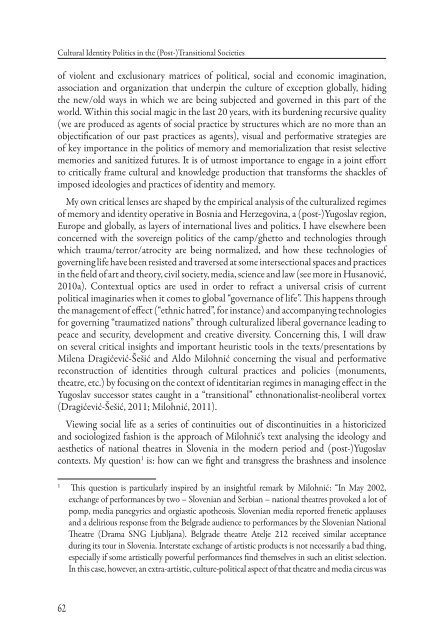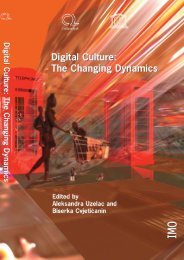free download in pdf format - Culturelink Network
free download in pdf format - Culturelink Network
free download in pdf format - Culturelink Network
You also want an ePaper? Increase the reach of your titles
YUMPU automatically turns print PDFs into web optimized ePapers that Google loves.
Cultural Identity Politics <strong>in</strong> the (Post-)Transitional Societies<br />
of violent and exclusionary matrices of political, social and economic imag<strong>in</strong>ation,<br />
association and organization that underp<strong>in</strong> the culture of exception globally, hid<strong>in</strong>g<br />
the new/old ways <strong>in</strong> which we are be<strong>in</strong>g subjected and governed <strong>in</strong> this part of the<br />
world. With<strong>in</strong> this social magic <strong>in</strong> the last 20 years, with its burden<strong>in</strong>g recursive quality<br />
(we are produced as agents of social practice by structures which are no more than an<br />
objectifi cation of our past practices as agents), visual and per<strong>format</strong>ive strategies are<br />
of key importance <strong>in</strong> the politics of memory and memorialization that resist selective<br />
memories and sanitized futures. It is of utmost importance to engage <strong>in</strong> a jo<strong>in</strong>t eff ort<br />
to critically frame cultural and knowledge production that transforms the shackles of<br />
imposed ideologies and practices of identity and memory.<br />
My own critical lenses are shaped by the empirical analysis of the culturalized regimes<br />
of memory and identity operative <strong>in</strong> Bosnia and Herzegov<strong>in</strong>a, a (post-)Yugoslav region,<br />
Europe and globally, as layers of <strong>in</strong>ternational lives and politics. I have elsewhere been<br />
concerned with the sovereign politics of the camp/ghetto and technologies through<br />
which trauma/terror/atrocity are be<strong>in</strong>g normalized, and how these technologies of<br />
govern<strong>in</strong>g life have been resisted and traversed at some <strong>in</strong>tersectional spaces and practices<br />
<strong>in</strong> the fi eld of art and theory, civil society, media, science and law (see more <strong>in</strong> Husanović,<br />
2010a). Contextual optics are used <strong>in</strong> order to refract a universal crisis of current<br />
political imag<strong>in</strong>aries when it comes to global “governance of life”. Th is happens through<br />
the management of eff ect (“ethnic hatred”, for <strong>in</strong>stance) and accompany<strong>in</strong>g technologies<br />
for govern<strong>in</strong>g “traumatized nations” through culturalized liberal governance lead<strong>in</strong>g to<br />
peace and security, development and creative diversity. Concern<strong>in</strong>g this, I will draw<br />
on several critical <strong>in</strong>sights and important heuristic tools <strong>in</strong> the texts/presentations by<br />
Milena Dragićević-Šešić and Aldo Milohnić concern<strong>in</strong>g the visual and per<strong>format</strong>ive<br />
reconstruction of identities through cultural practices and policies (monuments,<br />
theatre, etc.) by focus<strong>in</strong>g on the context of identitarian regimes <strong>in</strong> manag<strong>in</strong>g eff ect <strong>in</strong> the<br />
Yugoslav successor states caught <strong>in</strong> a “transitional” ethnonationalist-neoliberal vortex<br />
(Dragićević-Šešić, 2011; Milohnić, 2011).<br />
View<strong>in</strong>g social life as a series of cont<strong>in</strong>uities out of discont<strong>in</strong>uities <strong>in</strong> a historicized<br />
and sociologized fashion is the approach of Milohnić’s text analys<strong>in</strong>g the ideology and<br />
aesthetics of national theatres <strong>in</strong> Slovenia <strong>in</strong> the modern period and (post-)Yugoslav<br />
contexts. My question1 is: how can we fi ght and transgress the brashness and <strong>in</strong>solence<br />
1 Th is question is particularly <strong>in</strong>spired by an <strong>in</strong>sightful remark by Milohnić: “In May 2002,<br />
exchange of performances by two – Slovenian and Serbian – national theatres provoked a lot of<br />
pomp, media panegyrics and orgiastic apotheosis. Slovenian media reported frenetic applauses<br />
and a delirious response from the Belgrade audience to performances by the Slovenian National<br />
Th eatre (Drama SNG Ljubljana). Belgrade theatre Atelje 212 received similar acceptance<br />
dur<strong>in</strong>g its tour <strong>in</strong> Slovenia. Interstate exchange of artistic products is not necessarily a bad th<strong>in</strong>g,<br />
especially if some artistically powerful performances fi nd themselves <strong>in</strong> such an elitist selection.<br />
In this case, however, an extra-artistic, culture-political aspect of that theatre and media circus was<br />
62



